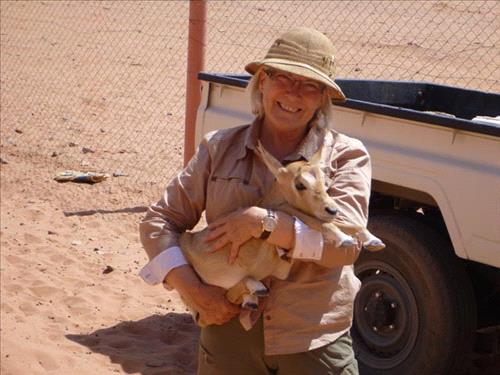Ammon News - AMMONNEWS -Australian Michelle Cotton is a world-travelling wildlife veterinarian. She boarded a flight to Jordan over one year ago thinking she would provide nursing care to Arabian oryx, lynx and wolves, but ended up with camels, donkeys and goats.
"I thought I was going to be a wildlife vet but I turned out to be the assistant to the local practitioner in Wadi Rum, [curing] bedouins' camels," Cotton, a member of the international development organisation Australian Volunteers International (AVI), told The Jordan Times.
Cut into sandstone and granite rock in southern Jordan, the country’s largest wadi (Arabic for valley) houses camel breeders and herders who also offer tours of the vast desert to adventure-seeking tourists.
Smiling cheerfully, Cotton recalled when the freshly graduated Jordanian vet told her he did not have the faintest idea how to deal with camels, just like her.
“I told him: Let’s learn together, and we did it,” the 65-year-old vet from Sydney said, adding that they eventually brought books on camels, went to visit them and learned how to "nurture them".
Cotton is one of many AVI volunteers who, over the years, have been working with local agencies scattered across Lebanon, Syria and Jordan, passing on their technical expertise to local communities.
“We have placed volunteers in over 65 assignments across the Middle East since 1995, when the first two volunteers lent their support in the West Bank city of Ramallah,” Rana Naber, programme officer at AVI, told The Jordan Times.
Tackling issues such as human rights, women's rights, transparency and the environment, the volunteers are assigned to tasks lasting up to two years in local communities, where they give expertise and hope.
“In Australia, I was a criminal lawyer, but the work I have done internationally touched upon human rights,” 31-year-old Trisha Randhawa said, adding that she arrived in summer and would stay in the Kingdom for two years.
Randhawa works for the Mizan Law Group for Human Rights, an NGO based in Amman and made up of a team of advocates campaigning for the enhancement of democracy. “Mizan is two-fold. It runs a legal clinic with a team of specialised Jordanian lawyers giving free legal advice and assistance to victims of human rights violations, and supervises specialised human rights programmes.”
Lacking enough specialised personnel, Randhawa said Mizan’s resources were overstretched, forcing the staff to work round-the-clock.
All AVI volunteers must attend an intensive pre-departure training course focused on how to cope with cross-cultural differences and support people “from the sideline”, according to Naber.
“At first, they need to sit in the back and only after a while start working with the assigned local team as they may be initially perceived as a threat or a challenge to the internal work,” Naber said, adding that one volunteer spent the first three months of his programme learning the names of all the people living in the local community.
“He asked who was getting married, who was father of whom, eventually winning people’s trust and ending up being accepted as one of [them].”
Coming from a background of activism for Aboriginal communities, Samantha Hutt, herself of Aboriginal descent, said her work was showing tangible results.
Working for the Insan Association, a Beirut-based NGO promoting the rights of marginalised people, families and children in Lebanon, the 32-year-old from Brisbane said her task was to support exploited migrant-domestic workers from Ethiopia, the Philippines, Sri Lanka and Bangladesh.
“There are two major streams of issues they face in the country. The first is linked to their labour conditions as they even lack the right to quit without the employer's previous consent, and the exploitation of their human rights in a broader sense.”
Hutton’s role is to make sure that the issues concerning migrants’ rights in the Middle East find a space on the international agenda.
“Migrants’ rights in the Arab states is a very much overlooked issue, as the discourse is largely focused on the rights of migrants in Europe. What rights these people have in the Middle East and how we can protect them is a big part of our work.”
A lot of patience and work is dedicated to gaining local people's trust and overcoming fear and suspicion of further exploitation, according to the volunteers.
“The people in the region saw the foreign vet working with the local doctor… [so] they understood I was not there to make money but only to help. Now they accept me,” Cotton said.
“Now I can freely tell the bedouin: Look, your animals would be much healthier if you took better care of them. If they see advantages they would start trusting you and listening to you.”JORDAN TIMES
